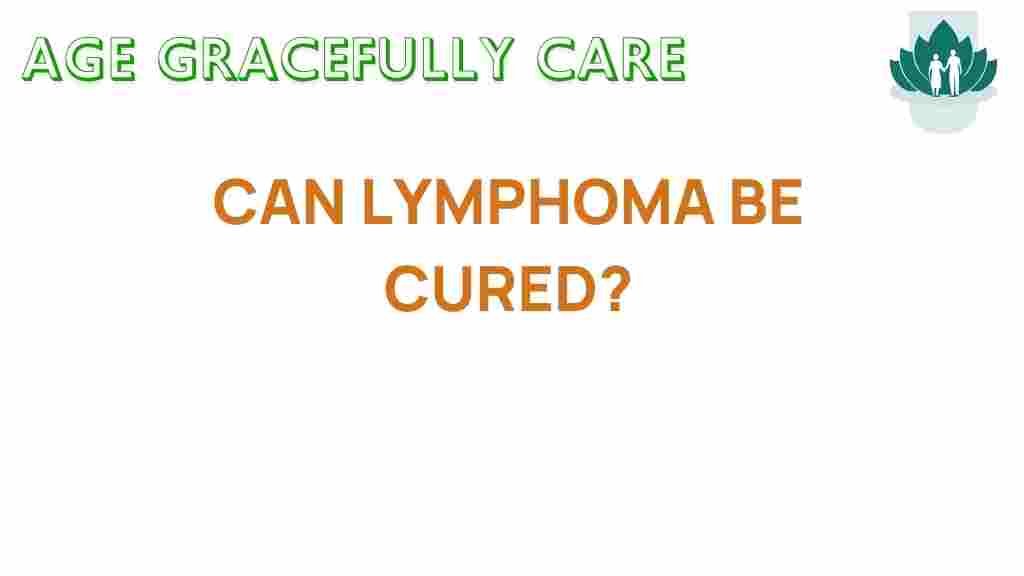Can Lymphoma Be Cured? Understanding the Latest Insights
Lymphoma is a type of cancer that originates in the lymphatic system, which is an integral part of the body’s immune system. As with many forms of cancer, patients and their families often grapple with the question: can lymphoma be cured? This article aims to unravel the latest insights into lymphoma treatment, cure rates, patient outcomes, and the advancements in research that are shaping the future of lymphoma treatment. We will explore chemotherapy, immunotherapy, clinical trials, and the overall health news surrounding lymphoma.
Understanding Lymphoma
Lymphoma is primarily categorized into two main types: Hodgkin lymphoma (HL) and non-Hodgkin lymphoma (NHL). These two types have different characteristics and treatment approaches. Knowing which type of lymphoma a patient has is crucial for determining the appropriate treatment plan.
Current Cancer Treatment Options for Lymphoma
When discussing lymphoma, the focus often shifts to treatment options and potential outcomes. The most common cancer treatments for lymphoma include:
- Chemotherapy: This involves the use of drugs to kill cancer cells. It is often the first line of treatment for many types of lymphoma.
- Immunotherapy: This innovative approach helps the immune system recognize and attack cancer cells. Treatments like CAR T-cell therapy have shown promise.
- Radiation Therapy: Often used in conjunction with other treatments, radiation targets specific areas where lymphoma is present.
- Stem Cell Transplant: This may be considered for patients with relapsed lymphoma, allowing for higher doses of chemotherapy.
Cure Rates and Patient Outcomes
Understanding cure rates for lymphoma is essential for patients and their families. The cure rates can vary significantly based on various factors:
- Type of Lymphoma: Hodgkin lymphoma generally has higher cure rates compared to non-Hodgkin lymphoma.
- Stage of Disease: Early-stage lymphomas are usually more treatable than advanced stages.
- Patient’s Age and Health: Younger patients and those in better overall health tend to have better outcomes.
Recent research indicates that the five-year survival rate for Hodgkin lymphoma is about 87%, while for non-Hodgkin lymphoma, it varies widely depending on the specific subtype, with some types showing cure rates as high as 70-90% with appropriate treatment.
Research Advancements in Lymphoma Treatment
Continuous advancements in research are significantly improving the landscape of lymphoma treatment. Clinical trials are at the forefront of these advancements, providing patients access to cutting-edge treatments. Here are some key areas of research:
- Targeted Therapy: Research is focused on developing drugs that target specific genetic mutations in lymphoma cells.
- Immunotherapy Innovations: New forms of immunotherapy, such as checkpoint inhibitors, are being explored to enhance the immune response against lymphoma.
- Combination Therapies: Studies are investigating the effectiveness of combining different treatment modalities to improve outcomes.
For the latest information on lymphoma research and clinical trials, patients can refer to reputable sources such as the National Cancer Institute.
Clinical Trials: A Path to New Treatments
Clinical trials play a crucial role in determining the effectiveness of new lymphoma treatments. Participating in clinical trials can provide patients with access to the latest therapies that are not yet widely available. Here’s how to get involved:
- Consult Your Oncologist: Discuss the possibility of clinical trials with your healthcare provider.
- Research Available Trials: Use platforms like ClinicalTrials.gov to find trials that match your condition.
- Evaluate Eligibility: Each trial has specific criteria; ensure you understand them before proceeding.
Troubleshooting Common Concerns
Patients considering lymphoma treatment may have various concerns. Here are some common issues and tips to address them:
- Side Effects of Treatment: Discuss potential side effects with your doctor. They can provide strategies to manage symptoms effectively.
- Emotional Well-being: Join support groups or speak with a mental health professional to cope with the emotional toll of cancer.
- Financial Concerns: Inquire about financial assistance programs that can help cover treatment costs.
Staying Informed and Engaged
Staying informed about the latest health news related to lymphoma is crucial for patients and their families. Here are some ways to keep up:
- Follow Reputable Health News Sources: Websites like American Cancer Society provide updates on cancer treatments and research.
- Engage with Patient Advocacy Groups: Organizations dedicated to lymphoma can provide resources and community support.
- Attend Educational Workshops: These can provide valuable information about managing lymphoma and treatment options.
Conclusion: Is There Hope for a Cure?
In conclusion, while lymphoma remains a serious illness, advancements in cancer treatment are leading to better cure rates and patient outcomes. With ongoing research, particularly in the fields of chemotherapy and immunotherapy, hope continues to grow for those affected by lymphoma. The path to finding a cure is being paved by clinical trials and innovative therapies that are changing the landscape of cancer treatment.
Ultimately, staying informed, engaged, and proactive about treatment options can empower patients and their families in their fight against lymphoma. While the question “Can lymphoma be cured?” may not have a definitive answer for everyone, there is a wealth of information and resources available that can help guide patients on their journey.
This article is in the category Health and created by AgeGracefullyCare Team
